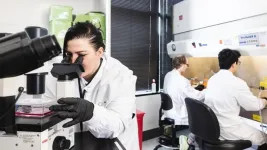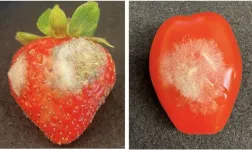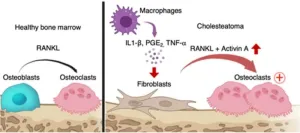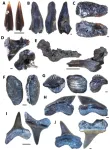The Access to Advanced Health Institute receives $18 million award to develop a temperature stable, single-dose chikungunya RNA vaccine through a phase 1 clinical trial
2023-08-03
(Press-News.org)
The Access to Advanced Health Institute Receives $18 Million Award to Develop a Temperature Stable, Single-Dose Chikungunya RNA Vaccine Through a Phase 1 Clinical Trial
KEY POINTS:
The goal of the award is to develop an effective chikungunya vaccine candidate that can reach endemic areas of the world by using AAHI’s innovative RNA platform technology.
The project will demonstrate that classic large-scale manufacturing challenges of live-attenuated vaccines can be overcome by using standard manufacturing equipment and techniques that are easy to tech transfer and scale.
The award supports a first-in-human clinical trial of a dried (lyophilized) formulation of AAHI’s RNA platform technology.
SEATTLE, Washington, August, xx, 2023 – The Access to Advanced Health Institute (AAHI) announced today that it has received an $18 million award from the National Institutes of Health (NIH) to develop a temperature stable, single-dose vaccine candidate for the chikungunya virus. The vaccine uses the innovative RNA platform technology to protect against the virus, a major cause of morbidity and mortality in Asia, Africa and Latin America for which no vaccine exists. AAHI’s approach to an RNA vaccine against chikungunya is distinctly different from the RNA vaccines which are currently approved by the FDA to prevent other diseases. Unlike other RNA vaccines, this candidate will generate a live “attenuated” virus that could potentially induce strong and long-lasting immune protection against this mosquito-borne disease. The award from NIH will support development, preclinical testing and human clinical evaluation of a vaccine that meets an increasingly urgent need for a reliable, abundant supply.
While not commonly fatal, chikungunya virus causes fever, headache, rash, and debilitating often chronic joint and muscle pain. People with chronic chikungunya symptoms often overwhelm healthcare services in areas of the world where there is already poor healthcare infrastructure, which perpetuates health inequity. The goal of the award is to develop an effective chikungunya vaccine candidate that can reach endemic areas of the world. AAHI’s RNA vaccine technology does not require the complex manufacturing techniques associated with traditional live-attenuated vaccines or deep cold-chain storage. It accomplishes this by binding RNA to the exterior of a proprietary nanostructured lipid carrier (NLC) delivery vehicle, which protects the RNA and safely and efficiently delivers it to cells. Researchers at AAHI will develop a dried (lyophilized), live-attenuated RNA vaccine candidate that delivers the full-length RNA genome of a weakened version of the Chikungunya virus complexed to the NLC, in a vaccine formulation expected to be stable at ambient temperatures for several months and in the refrigerator for at least a year.
“This project will demonstrate the use of RNA vaccine technology to avoid some of the classic manufacturing challenges in the large-scale manufacture of live-attenuated vaccines,” said Emily Voigt, PhD, Principal Scientist, AAHI RNA Platform Lead, and Co-Principal Investigator for the award (AAHI’s CEO, Dr. Corey Casper, serves as the other Principal Investigator on the Award). “Additionally, our RNA vaccine platform uses standard manufacturing equipment and techniques employed by vaccine manufacturers worldwide that are easy to tech transfer and scale, unlike current mRNA vaccine technology. We hope that these advances will ultimately increase availability and access to highly effective vaccines. This is the first attempt, to the best of our knowledge, to advance a RNA-launched live- attenuated vaccine candidate to the clinic.”
The 5-year project builds upon work supported by the NIH (R43AI127053) for AAHI’s proof-of-concept ground-laying work, which demonstrated that a liquid presentation of this live-attenuated chikungunya RNA vaccine candidate elicited strong immune responses in animals after a single dose, protecting them from mortality and joint swelling after being challenged with the virus (Voigt et al. 2021). NIH’s support for the development of a temperature stable, single-dose chikungunya vaccine candidate that is safe and immunogenic in humans may enable future development of other RNA-delivered live-attenuated vaccine candidates against other viruses that disproportionately affect poor and marginalized areas of the world. AAHI plans to expand on this work to develop more efficient and equitably accessible RNA vaccines that can reach people in all areas of the world, regardless of geography or socio-economic status.
This project is funded by the National Institute of Allergy and Infectious Diseases, a part of the NIH, under award #75N93023C00018.
The views and conclusions contained herein are those of the authors and should not be interpreted as necessarily representing the official policies or endorsements, either expressed or implied, of the U.S. Government.
####
AAHI is a nonprofit biotech research institute located in Seattle, Washington, that combines the high-quality science of an academic research organization with the product development capabilities of a biotech company to help combat some of the world’s deadliest diseases, including infectious diseases such as COVID-19, mosquito- and tick-borne diseases, cancer, fungal and parasitic infections, and other non-communicable diseases. For nearly three decades, AAHI, previously known as the Infectious Disease Research Institute, has focused on creating immune-enhancing technologies that improve the body’s natural response to disease. Through collaborations, AAHI brings innovative products from the lab to the clinic to the people, furthering AAHI’s mission to bring together the best experts, technologies, and platforms to create accessible, high-quality products and solutions. AAHI is working to build a world in which every person has access to tools that harness their immune system and allow them to live a healthy life free of illness and disease. For more information, go to AAHI.org or follow us on LinkedIn.
Media Contacts:
Casey Benadof
Media@aahi.org
(206) 960-1479
END
ELSE PRESS RELEASES FROM THIS DATE:
2023-08-03
It’s a mold that causes billions in crop losses every year, infecting berries, tomatoes and most other fruits and vegetables. Now, researchers have found a way to defeat the mold without showering toxic chemicals on the crops.
If you’ve ever seen a fuzzy gray strawberry, you’ve seen gray mold. It affects more than 1,400 different plant species, and there is no real cure for it. Being able to control it may hinge on the discovery of lipid “bubbles” secreted by the ...
2023-08-03
Research Highlights:
In a retrospective analysis of stroke patients, Black adults who had a stroke due to a severe blockage of a major artery in the brain (intracranial atherosclerotic stenosis) were younger, had higher rates of high blood pressure and Type 2 diabetes, and had lower physical activity scores compared to non-Black adults.
After one year of aggressive, individualized medical management, including lifestyle coaching and regular follow-up care, diastolic blood pressure and physical activity scores improved among Black adults.
Embargoed until 4 a.m. CT/5 a.m. ET, Thursday, Aug. 3, 2023
DALLAS, Aug. 3, 2023 — Significant stroke risk factor disparities ...
2023-08-03
Osaka, Japan – Chronic inflammation of the middle ear can cause several problems and complications that can affect a person’s hearing and balance. One such problem is the formation of a cholesteatoma, which is an abnormal collection of cells in the ear that can cause bone erosion if left untreated. In turn, this can cause symptoms such as hearing loss, dizziness, facial paralysis, and even a brain infection.
In a study published recently in Nature Communications, researchers from Osaka University have revealed the cause of cholesteatomas, which may help in developing new therapies for patients who are suffering ...
2023-08-03
A machine commonly used for pain relief has shown to improve breathing in patients with obstructive sleep apnoea, a clinical trial has found.
Results of the TESLA trial, published today in eClinical Medicine by researchers from King’s College London and Guy’s & St Thomas’ NHS Foundation Trust, shows the potential of a new therapeutic option for patients using a transcutaneous electrical stimulation (TENS) machine.
Sleep apnoea affects about 1 billion people worldwide, and millions in the UK. The condition can be frequently associated with snoring; ...
2023-08-03
CLEVELAND—What if there was a more effective way to coach and inspire your employees? Athletes? Students? Even your kids?
A new study by a team of researchers from Case Western Reserve University suggests there is.
Their newly published work used neuroimaging to peer into the brains of participants as they responded to two different styles of coaching. The researchers wanted to see what happens in the brain that either helps people grow or causes them to resist change.
“You could say it’s about how we get around the problem that you can lead a horse to water, but you can't make it drink,” said Anthony “Tony” ...
2023-08-03
Canadian vertebrate palaeontologist, Aaron Kilmury, and a team of researchers from the University of Manitoba have published new research in PeerJ Life and Environment, unveiling the first-ever formal description of microvertebrate fossil assemblages from the late Cenomanian to middle Turonian periods in Manitoba, Canada.
“One of the most significant findings of this study is that the new microvertebrate material described from Manitoba shares several similarities with microvertebrate assemblages collected ...
2023-08-03
Researchers have found that robots can have a ‘U-shaped’ effect on profits: causing profit margins to fall at first, before eventually rising again.
The researchers, from the University of Cambridge, studied industry data from the UK and 24 other European countries between 1995 and 2017, and found that at low levels of adoption, robots have a negative effect on profit margins. But at higher levels of adoption, robots can help increase profits.
According to the researchers, this U-shaped phenomenon is due to the relationship between reducing costs, developing new processes ...
2023-08-03
Northern muriquis, which live in the Atlantic forest of Brazil, are one of the most endangered species of monkey in the world. Choosing good mates and rearing thriving offspring are key to the species’ long-term survival.
To better understand what goes on in the mating lives of muriquis, researchers at the University of Texas at Austin and the University of Wisconsin–Madison turned to the monkeys’ poop to help gain insight into how the primates choose their mates.
In a paper published on Aug. 2 in the journal Proceedings of the Royal Society B, the scientists combined genetic analysis with long-term behavioral observations to better understand the ...
2023-08-03
CONTACT: Camille Jewell
cjewell@vancomm.com or 202-248-5460
SAN DIEGO—Using a “care hotel” model, which discharges patients to a specialty hospital hotel after smaller surgeries, can lower costs and shorten patients’ time in the hospital, according to a study presented today at the Society of NeuroInterventional Surgery’s (SNIS) 20th Annual Meeting.
Rising health care costs pose a significant financial burden across the U.S., especially since the start of the COVID-19 pandemic. Researchers at the Mayo Clinic Florida ...
2023-08-03
CONTACT: Camille Jewell
cjewell@vancomm.com or 202-248-5460
SAN DIEGO—A study presented today at the Society of NeuroInterventional Surgery’s (SNIS) 20th Annual Meeting noted that mechanical thrombectomy, a standard treatment for adults with a large vessel occlusion, a type of severe ischemic stroke, is also safe and effective for treating children.
A large vessel occlusion is caused by a blood clot that blocks a large vessel, cutting off significant blood flow to the brain. The faster that patients with this kind of stroke receive mechanical thrombectomy, a minimally invasive procedure ...
LAST 30 PRESS RELEASES:
[Press-News.org] The Access to Advanced Health Institute receives $18 million award to develop a temperature stable, single-dose chikungunya RNA vaccine through a phase 1 clinical trial







